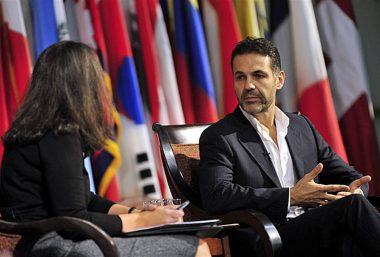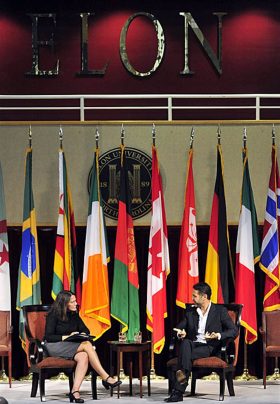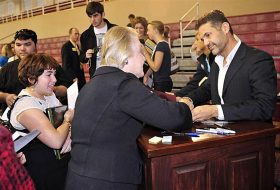Bestselling author Khaled Hosseini visited Elon University on Tuesday as the keynote speaker for Fall Convocation, and during his time on stage, the Afghan native implored students to travel the world in the coming years to better understand how events around the globe impact their lives at home.
Hosseini, wearing a dark suit and an open collar button-down shirt, sat relaxed as he traded ideas with Connie Book, associate dean of the School of Communications, in a question-and-answer discussion that deviated from the speech format that has been a tradition of recent Convocations.

With two chairs separated by a small table, Book asked the author questions previously submitted by students who wanted more information on Afghanistan and the literary techniques Hosseini employed in his two best-selling novels, The Kite Runner and A Thousand Splendid Suns.
Hosseini, founder of a nonprofit foundation dedicated to helping residents of his native country, fielded those questions and then some. What he emphasized at several points, and in different fashions, is that no foreign nation has ever emerged victorious from war in Afghanistan and that the best course of action for the United States would be to treat its efforts there not so much as a war on terror – but as a “war on poverty.”
More people die in Afghanistan because of poverty, he said, from the 25,000 women each year killed during childbirth to the 20 percent of all children who never reach the age of 5. About half the nation lives on less than $1 a day, he said, and clean water is inaccessible to swaths of the population.
“When people have a semblance of a job, when they have a roof over their head, when there’s some water on the table, some bread, a sense of predictability to their life, maybe there’s a school they can send their kids to, then they’re much less likely to be influenced, to be persuaded, by the extremists,” he said.
Book quizzed Hosseini on his ability to write A Thousand Splendid Suns, Elon University’s Common Reading selection for 2009-2010, in such a way that many women were able to emotionally connect with characters drawn from the imagination of a man.
How did he do that? “A steady stream of The View, Oprah…” joked Hosseini, eliciting laughs from the audience. However, he said, his trouble writing the book emerged because of his efforts to write from a female point of view.
“The more I tried, the more hopeless it became, and the worse the writing got,” he said. “At some point I gave up and I said, ‘I’m just going to focus on Mariam and Laila as human beings more than ‘Afghan women.’”

“Spontaneously the characters began to speak for themselves and that magical thing happened that hopefully happens to every writer in the course of writing a novel, which is that the characters get away from you and that you’re no longer the ventriloquist moving the puppet, but rather that you’ve now become the mouthpiece for these characters and they are now leading the story rather than the other way around.”
As Convocation drew to a close shortly after 5 p.m., Hosseini offered advice to his audience, in particular students. As technology makes the world smaller, he said, it’s imperative for young people to travel to better understand events on the world stage.
“The days when we lived in a world where what happens halfway across the globe didn’t affect us, those days are over,” he said. “Technology has changed everything, and that has been both a blessing and a curse. In a way we live in a much, much smaller world. That means that we have to learn about each other, because what happens across the ocean will boomerang and affect us.”
More than 2,000 people, from students to faculty to community members and friends of the university, attended the event in Alumni Gym.
The author was introduced by Aldona Wos, a former U.S. ambassador to Estonia and, like Hosseini, an immigrant to the United States who arrived in the country as a child. And, like Hosseini, Wos described her own experience growing up as she desired to be an ambassador while initially choosing to work as a doctor because it was a safe career to pursue in the eyes of her family.
Hosseini was born in Kabul, Afghanistan, in 1965, the son of a diplomat with the Afghan Foreign Ministry and a Farsi and history teacher at a large high school. The Hosseinis sought and were granted political asylum in the United States after a communist coup overthrew the government in 1980.
Hosseini earned a bachelor’s degree in biology at Santa Clara University in 1988. The following year, he entered the University of California-San Diego’s School of Medicine, where he earned a medical degree in 1993. He completed his residency at Cedars-Sinai Hospital in Los Angeles.
While in medical practice, Hosseini began writing, The Kite Runner, which was published in 2003. In 2006 he was named a goodwill envoy to UNHCR, the United Nations Refugee Agency. A Thousand Splendid Suns was published in May 2007.

Khaled has been recently working to provide humanitarian assistance in Afghanistan through The Khaled Hosseini Foundation. He lives today in northern California.


